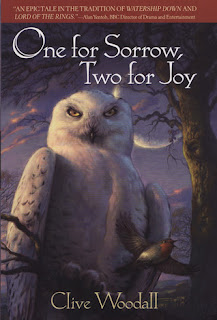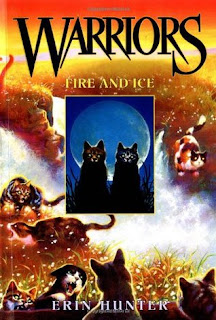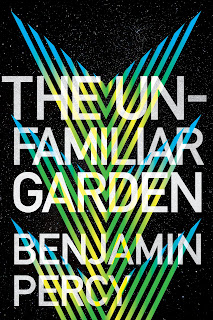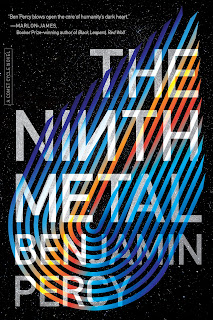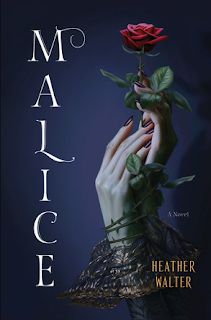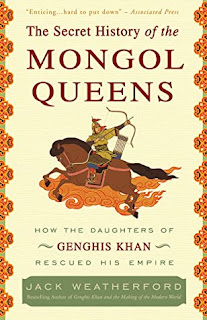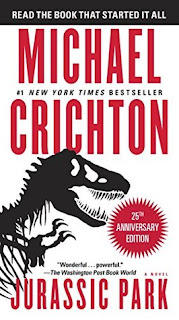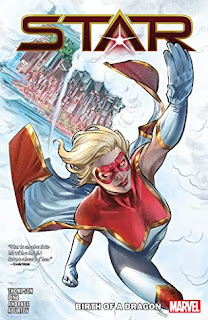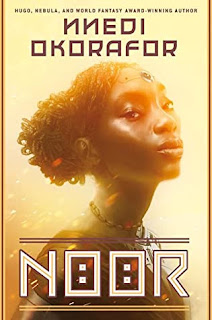I've had Clive Woodall's One for Sorrow, Two for Joy for a very long time (I suspect at least 15 years). I was going to read it several months ago, but for some reason never actually started it (though the bookmark I was going to use was still in the book!) So a few days ago (after reading a decluttering book that I didn't write about here), I decided to actually start reading it, otherwise I was going to send it on its way. Luckily I was hooked within the first few chapters and decided to finish it.
Monday, December 26, 2022
One for Sorrow, Two for Joy
I've had Clive Woodall's One for Sorrow, Two for Joy for a very long time (I suspect at least 15 years). I was going to read it several months ago, but for some reason never actually started it (though the bookmark I was going to use was still in the book!) So a few days ago (after reading a decluttering book that I didn't write about here), I decided to actually start reading it, otherwise I was going to send it on its way. Luckily I was hooked within the first few chapters and decided to finish it.
Monday, December 19, 2022
Dune
I bought Dune many years ago, having heard that it's an excellent science fiction book. But it's really long - about 800 pages - so I kept putting off reading it because I can read like 2 or 3 books in the time it will take me to read it. So Dune languished on my shelf until a month and a half ago, when I finally took the plunge (mainly because someone wanted to watch the new movie with me, lol. I didn't want to watch it until at least attempting to read the book!)
Friday, November 4, 2022
Namwayut
I've been trying to read a book for Canada's National Day of Reconciliation in an effort to educate myself on topics pertinent to the day. This year I found the perfect book at work: Namwayut: A Pathway to Reconciliation by Chief Robert Joseph. It took me a bit of a long time to read it (I started it on October 5th, a few days after the National Day of Truth of Reconciliation, and finished it today, November 4th). While Chief Joseph's writing is very engaging and overall enjoyable, he does share some of his history with the residential schools and the racism he encountered, making this a more difficult read that takes some time. I loved how his overall tone is very hopeful for the future - he shows how far Canada has already come on our path towards reconciliation. I do hope to one day reread Namwayut - it is the kind of book that I feel I will get more out of with subsequent reads. It's also the kind of book that is worth rereading, much like The Diving Bell and the Butterfly, for the hope and incredible spirit of the author.
Sunday, October 16, 2022
Magical Boy: Volume 2
After a several month wait, Magical Boy: Volume 2 was finally released! I was very excited to see it - I couldn't wait to see how the story ended!
Magical Boy: Volume 2 starts off where Volume 1 ended: the third gate is open! But all is not lost - Walnut tells Max and company that they have a chance to close the gates still. Unfortunately, Max's mom starts really freaking out on him for going against the family's traditional magical girl heritage, blaming that for the opening of the third gate.
Max isn't the only one dealing with disapproving parents. Pyper's family hauls her into church where she is publicly disowned for admitting her truth. And Sean has to deal with his own father thinking he isn't good enough. But with the demons feeding off negative emotions to bring their leader through the gate, all this hate and sadness is definitely working against our heroes!
Once again, I enjoyed Magical Boy. The story was brought to a satisfying conclusion and I enjoyed learning more about our heroes! I look forward to reading future releases from The Kao. :)
Monday, September 26, 2022
The Poppy War
My mom and I went shopping earlier this month, and I bought a few books that sounded really good. The first one was The Poppy War by R. F. Kuang.
The Poppy War tells the story of Rin, a war-orphan who has set her sights on attending Sinegard, her country's best military academy. After acing the entrance test, she quickly discovers that getting in was the easy part - remaining at Sinegard will be more of a challenge, especially when the other students and some of the teachers do not believe she belongs.
I was fully on board with The Poppy War through this beginning part. I thought it was really interesting being along with Rin's struggles and fight to remain there, how she accidentally opened herself up to a God, and ended up pledging Lore after her first year, rather than Strategy like she planned. I loved her quirky teacher, Jiang, and really enjoyed their interactions as he imparted his wisdom to her in his unique way.
But then parts 2 and 3 of the book happened. Rin's country, Nikara, has long been threatened by the Federation of Mugen, a neighbouring island nation that was hellbent on conquering Nikara. When war breaks out, Rin and her classmates quickly find themselves drafted into the army. Rin is given to the Cike, a small division made up entirely of shamans (people connected to the gods).
These sections of the book get progressively more and more difficult to read. Rin's commander seems to slip more and more into madness from his god, while also under tremendous pressure to succeed. He is angered that Rin isn't calling the Phoenix (both their God), despite her having done so before. He ends up hitting her in a very uncomfortable scene, which makes her call forth the fire; he then remarks "So that's what it takes." This is made all the more uncomfortable because Rin seemed to have feelings for him.
But that didn't prepare me for the massacre of Golyn Niis (Chapter 21). I had no idea it was coming. I've since read that it is based off of a historical event where the Japanese massacred a Chinese city in much the same way.
After getting through that chapter, I honestly thought I was going to stop reading. But the book has good reviews, so I hoped it would get better. Besides, I had already made it through about 400 out of 500 pages. So I decided to persevere.
Unfortunately, while not as rough as that one chapter, I had a very hard time with the remainder of the book. Along with the very uncomfortable situations that Rin found herself in, I also could not longer connect with her as a character. She made some very terrible choices at the end of the book that I did not like reading about.
In the end, I found that The Poppy War was not the book for me. I will not be reading the rest of the trilogy.
Monday, August 29, 2022
Warriors: Fire and Ice
I finished Warriors Books 2: Fire and Ice the other day. Overall I found the book okay - I didn't like it as much as the first one though.
Fire and Ice picks up right after Into the Wild. Fireheart and Graystripe are warriors now, and just finished their vigils. They are then sent on their first warrior mission: to bring WindClan back after they were driven off by ShadowClan.
This....happened a lot easier and quicker than I thought it would. They picked up the trail fairly quickly, and basically brought everyone back without incident. But on their way back to ThunderClan, they returned through RiverClan territory because it was a shorter route, and managed to get into a fight. A ThunderClan patrol headed by Tigerclaw came to their rescue, but in the scuffle, a RiverClan warrior fell into the river and drowned. Everyone said there would be consequences from that, but the consequences never really materialized during the book, so I'm not really sure what will happen with that.
In the wake of those events, Bluestar declares they need to train more warriors, so both Fireheart and Graystripe are given new apprentices. While training their new apprentices, Graystripe encounters a she-cat from RiverClan whom he falls in love with. And with Graystripe being distracted and unavailable for Fireheart (and even for Graystripe's own apprentice), Fireheart finds himself spending more and more time back at the Two-Leg place with his sister (who brings her firstborn son to Fireheart to train as a Warrior, too).
Fire and Ice deals primarily with issues of fitting in, and loyalty. As a former kittypet, Fireheart feels he doesn't fit in with the others (some of which still bring up his kittypet roots), and doesn't have a shared history and culture with them. This is made even worse when he and Graystripe start scrapping because Fireheart is worried about (and uncomfortable covering for) him during his affair with the RiverClan cat.
While these are interesting topics (and important for kids to think about - these are children's books, afterall), I felt that the execution wasn't very good. The book felt like it was written mainly in a telling fashion, and so I had a really hard time picturing anything. It also kind of moved abruptly - something would happen, and suddenly it was months later.
So this definitely wasn't my favourite book. But I am hopeful that the next book, Forest of Secrets, will be better!
Monday, August 22, 2022
Warriors: Into the Wild
A while ago, a friend of mine got me the first five Warriors books by Erin Hunter. After finishing The Unfamiliar Garden, I wanted to read something totally different from what I've been reading lately, and thought this would be a good time to give them a try!
Thursday, August 18, 2022
The Unfamiliar Garden
Continuing with Benjamin Percy's Comet Cycle at the recommendation of a friend, I read book 2, The Unfamiliar Garden. This is the book that my friend said was even better than the first one, and I wholeheartedly agree!
The Unfamiliar Garden takes place in Seattle/Washington State. The night of the meteor shower five years ago, Jack Abernathy, a professor who specializes in fungus, went out into the woods to do some research. He brought his eight-year-old daughter, Mia, with him so he could keep an eye on her (and so his police detective wife, Nora, can get some sleep). But while his back was turned, Mia disappeared.
Five years later, Jack is a mess. He no longer cares about his job or his work, and Nora divorced him. For her part, Nora has thrown herself into her work as a homicide detective, bringing down murderers thanks to her ability to see the bigger picture. But the rains have returned to Seattle, leading to a flowering of fungi. And after one of his grad students gets sick after bringing in samples, Jack discovers a new parasitic fungus that seems to be infecting all animal life, including humans. And Nora starts seeing a rash of copycat ritualistic murders with no rhyme or reason, which ends up leading her to team up with her ex-husband to stop them.
I really liked The Unfamiliar Garden. The narrative was a lot tighter than The Ninth Metal because it was only following a few characters, most of who were more interconnected right from the beginning than the ones in The Ninth Metal.
I also really liked the plot and pacing of The Unfamiliar Garden. While I kind of knew from the beginning what was going on, it didn't matter. I'm also not a huge horror fan, but the horror elements in the book really worked. The plot also moves along at a really nice clip, which made me not want to put the book down (once I was near the end, I stayed up to finish it rather than wait for the next day!)
Very much recommended. I hope the third book in The Comet Cycle is as good as The Unfamiliar Garden!
Thursday, August 4, 2022
The Ninth Metal
A friend at work recommended The Ninth Metal to me. Along with saying it was a fast and entertaining read, he told me that the second book was even better. So I grabbed it from the library and gave it a read over the long weekend.
The Ninth Metal is the story of how the world changed after flying through the debris field of a comet. The comet debris rained down on the Earth, changing people, places, and technology for ever. One place that was changed was Northfall, Minnesota. The debris field that rained down on the area is mine-able, causing a sudden boom to the dying town. Everyone is flocking to Northfall much like they did during the gold rush in an attempt to make their fortune, mining the new omnimetal, which has revolutionized the world as a self-propelling power source.
But the omnimetal isn't just a power source. "Metal heads" are grinding it down to dust and smoking it, gaining strange visions during their highs. And some people, like ten-year old Hawkin, are blessed (or cursed) with strange new powers from the omnimetal.
The Ninth Metal mainly follows several characters from Northfall: John Frontier: youngest son of the Frontier family, who run a mining company that is profiting from omnimetal while trying to keep other corporations out; Victoria, a PhD physicist recruited by the government for some top-secret work in Northfall; and Stacie, a rookie cop who wants to help others. While their stories and lives seem quite discreet, slowly they are drawn together by the events that unfold in Nightfall.
While I wasn't sure where the story was going in the beginning, I quite liked The Ninth Metal. I'm looking forward to reading the second book in Benjamin Percy's Comet Cycle, The Unfamiliar Garden, soon!
Monday, July 11, 2022
The Diamond Eye
I got my dad Kate Quinn's newest book, The Diamond Eye, for his birthday this year. After he finished reading it, he gave it to me to read as well. I'm a big fan of her novels, so I was really looking forward to it!
The Diamond Eye is the story of Lyudmila "Mila" Pavlichenko, a USSR history student who enlists in the army when the Nazis invade her country in WWII. It's based off the true story of Mila's life as she becomes an extraordinary sniper with an official tally of 309 kills. In Quinn's author note at the end of the book, she explains some of the creative license she took with the story, but almost everything in the book is based off of Mila's memoir (with the very notable exception of the assassin in the US who was after FDR).
In The Diamond Eye, Mila is a young mother who is struggling to get a divorce from her older husband, who seduced and impregnated her at 15. Mila lives in Alexi's shadow - the older doctor is certain he is destined for greatness. And though he is no longer interested in her, he doesn't want anyone else to have her, and so makes her life miserable. When she finds that he has taken her son to a shooting range when the boy is very young, she storms over there to get him. In the aftermath of their confrontation (Slavka heard his father say he will never be a man if she babies him so much), Mila promises that she will be as much a father for Slavka as a mother. And that promise starts by learning how to shoot. But after she finishes her advanced marksmen course, the Nazis invade. Knowing that she cannot live with herself if she doesn't fight to keep her son safe, Mila enlists. After a harrowing couple of months on the front with only a shovel, she eventually obtains her first rifle, and shows her commanding officer that she is able to shoot. And that sets her on the path to her 309 tally kills.
The first part of The Diamond Eye tells of Mila obtaining those 309 kills. While it was interesting to read, I admittedly felt like this was in some ways a story I had heard before from Quinn, just with different trappings (I'm specifically thinking of the Night Witches of The Huntress, where the women pilots were fighting to not only repel the Germans, but to be respected by the men around them). Interspersed through this were passages setting up the second part of the book, where Mila was sent on a diplomatic mission to the United States as a guest of Eleanor Roosevelt. An assassin was hired by enemies of the Roosevelts to kill the president; the assassin has decided to frame Mila in the plot to do so. It was when these two pieces of the plot came together that the book really took off. The end of the book was a really intense read - I didn't want to put the book down! I also didn't see some of the things coming, which always makes for a good read (as long as the twists don't come out of left field).
I really liked the triangle that was Mila, Lyonya, and Kostia. Lyonya and Kostia were such opposites (Lyonya had a larger than life personality, but was ridiculously kind-hearted, while Kostia was the silent and steadfast type), but they brought out the best in each other, and in Mila as well, as both her lover and her sniper partner. I also really liked how Mila grew through the story, coming into her own in all areas of her life. Honestly, I just really liked Mila, and wouldn't mind reading her memoir one day. :)
All in all, another excellent novel by Quinn. I heartily recommend it. :)
Wednesday, June 15, 2022
Misrule
100 years after the fall of Briar, Alyce (now named Nimara, after the first Vila) has built the Dark Court over the ruins of Briar. All the creatures of Malterre are welcome here, and they have been waging war against the Fae, gradually taking more and more of the Fae courts. But unknown to most of the other denizens of the Dark Court, Princess Aurora slumbers in a hidden wing of the palace. Nimara has spent much of the last century scouring every old book she can find for some hint on how to break this second curse. But when a mortal man washes up on their shore and unexpectedly wakes the sleeping princess, everything Nimara thought she knew is thrown into question.
Thursday, June 9, 2022
The Self-Care Cookbook: Easy Healing Plant-Based Recipes
I don't normally read cookbooks, at least from cover to cover (well, I admit, I didn't actually read all the details of the recipes in this one, either). But I made an exception for Gemma Ogston's The Self-Care Cookbook: Easy Healing Plant-Based Recipes because the book is only maybe half recipes. The rest is all helpful hints and tips to help you feel better. The book is kind of like a hug written from Ogston to you, helping you prioritize your own needs.
The Self-Care Cookbook is organized into different sections, depending on what you need. They cover the whole gamut of self-care topics, from restoring, reflecting, and rebalancing, all the way to TLC for when you just need help getting through the day. The recipes are put into this same structure, with recipes that are good for say restoring your energy all in one place. While I liked this organization in terms of the topics, I found it makes the cookbook a lot harder to flip through for recipe purposes, especially if you're just trying to find say an appetizer or a salad, because they're scattered throughout the book. I'm honestly not sure if I'm going to try the recipes, as I don't really remember what is where now. It does have an index, but I didn't find that particularly helpful either because it covers all the topics of the book, and there really aren't a ton of recipes here. Perhaps a separate recipe index would have been more helpful?
While I found that to be a shame, the rest of the book is honestly a delight. Ogston has wonderful tips to help you, no matter how you're feeling. Her writing style is also very engaging and welcoming, contributing to that feeling of this book being a hug to anyone who needs it.
The Self-Care Cookbook is a cute and helpful read for anyone who is looking for some self-care tips. But if you're more interested in new recipes, you might want to look elsewhere.
Sunday, June 5, 2022
Magical Boy: Volume 1
A friend of mine recommended Magical Boy to me the other day. It's adorable! It's about a trans man who finds out he is descended from a goddess and is the next incarnation of Magical Girl. Many, many years ago, the goddess sacrificed herself to banish an evil god behind a magical seal. The god sends his servants through little cracks (leaks) in the seal in an attempt to get free, and it's up to Magical Girl to stop them and seal the leaks. But Max, who had no idea about this, gets thrust into the role right as he is struggling to come out as a trans man!
I loved Max's friends, especially how with many of them, appearances were often deceiving. I also loved how supportive his father was right from the get-go.
Overall, I thought this was a really fun story that dealt really well with some difficult topics (like how hard it can be for LGBTQ+ people to come out, and how hard it can be for those closest to you to accept you as you are), as well as showing how wonderful and accepting people can be. I really enjoyed reading it, and I am looking forward to volume 2!
Monday, May 9, 2022
Malice
I stumbled on Malice by Healther Walter the other day on my first trip wandering around Chapters since the pandemic started. It's a Sleeping Beauty retelling told from the villain's perspective. It sounded fantastic, and though I was a bit leery that it was book 1 of the Malice series, I decided to give it a try.
Malice follows Alyce, a half-human half-Vila child who has always known she wasn't wanted. In her world, the Vila were eradicated by an alliance of Fae and humans, reviled as evil creatures. Submitted to horrible tortures when she was young, the Fae ambassador deemed her safe, and so she was sent to live in a Grace house, mixing elixirs for paying customers using drops of her blood. While there are many Graces, half-human and half-Fae children whose blood shines gold with Fae magic until it is exhausted, Alyce is the only Dark Grace, able to craft elixirs for jealous nobles wanting to damage their rivals. Despite being unique, no one lets her forget that Alyce is tainted by Vila blood - a monster, and different, someone to be reviled.
But then she meets the Princess Aurora. Aurora is the last heir of the Briar Throne, cursed to die by Vila magic unless she finds True Love's Kiss. And she is the only one to voluntarily seek out Alice's company, despite everyone else in the kingdom being opposed.
Overall, I really enjoyed Malice. The world it is set in was really interesting, particularly how the Graces functioned within it, but also the history of Briar (it was a Queendom because an ancient Queen was able to succeed at a Fae challenge where many men had failed, but over the years the Queens had given away most of their power to their husbands so they were now largely only figure-heads). I also liked a lot of the characters, although several of them really disappointed me as the narrative unfolded (I was particularly sad that Alyce embraced the villain role in the end a little too willingly - while I understand why it happened, it was really jarring because she was a good character all the way along to that point). It started to lose me a little at the end unfortunately thanks to this.
But overall, as I said, it was a great read. I finished it off in three days, staying up way too late in the process. I was really happy to get this into a book too because I've had a fairly dry reading spell as of late. Thankfully, I'll be able to continue with the story soon: Misrule, the second book, is released tomorrow! I've preordered it on my Kindle so I'll be able to finish the story soon! And even more fortunately, they are only a duology, so I'll be getting the end of the tale with Misrule. :)
Sunday, April 24, 2022
Own Your Morning: Reset Your A.M. Routine To Unlock Your Potential
My mom sent me a link with information from Liz Baker Plosser's Own Your Morning: Reset Your A.M. Routine To Unlock Your Potential as a joke. I've never liked getting up and have never, ever been a morning person. But after reading through the article, I decided to pick the actual book up on my tablet (yay Google Play Books!) and give it a read. I ended up choosing my tablet because a lot of the reviews said the book was structured like a magazine, so I thought it would be better to read there than on my Kindle.
Own Your Morning talks about ways to make your morning better for you. The book is very aware that everyone's morning will be different because we all have different lives and personalities, which I really liked. One of the early chapters was all about finding your (current) values, and trying to honour at least a few of them in your morning, which will set a better tone for you during the rest of the day. From there, it examines various aspects you might want to include, such as exercise and meditation, and talks about some of the benefits of each of these.
Unfortunately, as the reviews that suggested Own Your Morning would be better on a tablet kind of suggested, the book is a little light on details. While this makes it a very fun and easy read (which was great - I've been having trouble lately sitting down and reading stuff, so having a quick read was perfect for me right now), it does not go into depth on any of these topics. So if you're looking for a fun overview of things, it's good. But if you were hoping for more depth, you might not be happy with Own Your Morning.
The other feature of the book that I really liked was the interviews with different women who talked about their morning routines. While this really drove home the idea that everyone's morning is different, the interviews also gave some fun different ideas for what your morning can look like.
All in all, I really enjoyed reading Own Your Morning. I'm going to have to look at tweaking my own mornings, especially on work days. Maybe incorporating some of the tips I learned here will really help me own my mornings, too.
Sunday, April 3, 2022
The Deep
I've been wanting to read The Deep for awhile now, but finally sat down to read it a few nights ago. It tells the story of a mermaid (Yetu) who, as the historian, holds all the memories of her people, of their trauma and how they came to be. While she is gifted, she is also extremely sensitive, and the memories are literally killing her. So when the time comes, as it does every year, to let her people remember, she decides to run and save herself, rather than take the memories back at the end of the ritual (and so die). While she slowly regains herself and her sense of self away from the memories, she becomes increasingly aware that the memories are killing the rest of her people, and so needs to decide whether to live or to save them all.
I really enjoyed The Deep. I loved the worldbuilding around where the merpeople came from (they are descended from pregnant African slaves who were thrown overboard - the idea is that in the womb, babies are not breathing air, so what if they were born of the sea and never needed to breathe air? A very interesting narrative that has roots in songs - this article talks a bit about it, as well as the idea that people would like a memorial along the Atlantic trade routes, which is definitely deserved considering how many people died along them) And the idea of holding all the trauma from generations of your people (and it wasn't just the trauma, it was their actual memories) was really interesting - as historian, Yetu wasn't really living, she was living the lives and trauma of all the people who came before her.
Definitely check it out if you have the chance (and are okay with reading fantasy)!
Sunday, February 20, 2022
Starless
Starless is a short fantasy novella by Evan S. Sullivan telling the story of Calan Castillon. It goes back and forth between his youth and ten years later when he is part of an invasion to another land. The other land, Cavadere, invaded their lands during his youth and Calan's father was killed during the war to repel the invaders. Now the kingdoms who were invaded have created their own great fleet and strike out to conquer the enemy who invaded them. Calan was sent to honour his family's alliance with another kingdom, and Calan is incredibly resentful that his family abandoned him like that.
I had a really hard time connecting with Calan. Some of the things that happened, particularly in his youth, seemed really weird to me (I'm not positive how old he was, but he was able to wander around his city freely without an escort around the age of 8 or 9, and he's the nephew of the king). He didn't seem to understand how alliances work even though the book said he had political training once he was a bit older. And he was kind of just generally sullen, unlikable, and not particularly useful in the events of the story (his commanding officer disliked him and I actually found myself agreeing with the commander because through the early parts of the story, Calan was mainly standing around and doing nothing - though I will concede that this part of the story took place on a boat, and Calan says he has had no experience on one before).
Starless is a fairly short read (about 110 pages). I mention this because it felt like the story actually started around page 70 or so. Most of the things that happened before that were backstory that wasn't particularly needed; with the story coming from Calan's perspective alone, we could have taken his word on what he was feeling towards everyone else, particularly in his family, without the events needing to be shown. Even the events that fueled his nightmares weren't particularly needed for the narrative itself.
I did find the ending of the book to be interesting though. I admit that I clued in on what was most likely going to happen around page 70, but was still curious to see how it all unfolded and why. Calan reminded me of Arthas from Warcraft III in many regards with what happened in Starless, though their stories are by no means the same.
I was also intrigued by many of the other characters surrounding Calan. His cousins seemed particularly interesting (the princess heir to the throne who can apparently best two grown men/knights with a sword, and her younger brother who just wants to be a musician, not a prince) and it was a shame that this story didn't show more of them. I also wish the differences between the kingdoms had been explored in more detail (why do the women of the South get to use swords when the women of the North don't?), although I do understand there wasn't space for such things within Calan's narrative. I am hopeful that more of these characters and cultural differences will be explored in Deathless, Sullivan's new novel that I believe is set in the same world as Starless.
I'd also like to mention that the list of characters really came in handy when I started reading Starless, particularly in terms of the Castillon family (the king, his son, and his brother all have names starting with "R," so it took a bit to figure out who was who). I do wish there had been a map though to show the different kingdoms, particularly while trying to follow the events of the war. I firmly believe that fantasy books should all have maps to help the reader follow along.
Cash Cows, Pigs and Jackpots: The Simplest Personal Finance Strategy Ever
I picked up David Trahair's Cash Cows, Pigs and Jackpots: the Simplest Personal Finance Strategy Ever at the library the other day. It's been awhile since I've read a personal finance book, and this one sounded interesting. It's also Canadian, which is more relevant for me than American personal finance books, so that was a definite plus.
I thought I'd be in for some fun tales about get rich quick schemes. Or something more akin to JL Collins' The Simple Path to Wealth. Instead, Cash Cows, Pigs and Jackpots ended up a fairly basic personal finance book with only one main message: spend less than you make. While important (but not exactly earth-shattering) advice, that's not really a strategy per se. I've read other books (that I've liked better - check out some of the other personal finance books I've read) that give more details and strategies on how to pay down your debts, and more fun anecdotes from other people taking control of their finances.
Beyond that, Trahair looks at two important aspects of your personal finance: the question of buying or renting a place to live, and retirement. I found that the first discussion got bogged down by him walking you through a spreadsheet he made to help you decide on whether renting or buying is better for you (and since I'm not actively interested in that question at the moment, I wasn't really engaged by it). But I did find the discussion on condos interesting, just in terms of the other fees you need to consider when deciding whether buying one is right for you.
The retirement discussion mainly focussed around CPP and OAS here in Canada. While I was glad to hear that these are healthy and will be around for awhile (particularly CPP), most of the discussion was tied to the specifics of the "new" rules rolled out around 2012. Being 10 years out of date at the time of my reading it, I didn't care at all about these specifics, and so lost interest once again.
All in all, I didn't find Cash Cows, Pigs and Jackpots to be a very engaging read. I would have preferred less focus on the date specific numbers (and honestly less focus on hard numbers in general), and more focus on stories of people (there was one story in chapter four that was really interesting - I would have liked to read more of that in the book!)
Saturday, February 5, 2022
The Secret History of the Mongol Queens: How the Daughters of Genghis Khan Rescued His Empire
I picked up The Secret History of the Mongol Queens: How the Daughters of Genghis Khan Rescued His Empire by Jack Weatherford a few years ago, on a whim. I don't know a whole lot about Mongolia or Genghis Khan, but I was intrigued that his daughters might have had a hand in saving the empire he built.
The Secret History of the Mongol Queens is split into three parts. The first part was centered around Genghis Khan himself, showing how he built his empire and why his daughters played such an important part in it (he had been betrayed by many men throughout his life, and he needed someone he could trust running things while he took the men off to war). I found this part quite fascinating, especially with just how much power he gave his daughters.
The second part was, in my opinion, the hardest one to get through. This showed how, after his death, the men of his clan undermined and stole power from the women. There are some very dark events covered in this section (I'm not going to lie - a few events I wish I could go back to not knowing about - hopefully they will fade from my memory soon). But there were some really interesting people in this section, like Qaidu Khan and his daughter, Khutulun. Khutulun was a fierce warrior, and she vowed to only marry a man who could beat her at wrestling. While she did end up marrying someone eventually (in the wake of rumours that spread about her and her father having some sort of incestuous relationship), she was undefeated in wrestling!
The final section was about Manduhai and Dayan Khan. Manduhai ended up a queen put in an almost impossible situation after her husband passed away, because whoever married her would become the next Khan. But rather than marrying one of the three obvious contenders, she forged her own path by engaging herself to a child who was the final male heir of Genghis Khan. And rather than using him as most others might have, she ensured that he grew up to be a strong and wise leader, making sure that he was always along when she brought the Mongols to war. Together, the two of them reunited the shattered empire of Genghis Khan for good, while also ensuring that the surrounding countries understood that they had no interest in conquering more territory - the Mongols had learned that it was hard to administer a vast Empire. Though there was about 20 years between them, Manduhai and Dayan Khan stayed together until her death; neither of them took another spouse or tried to depose of the other (although they very easily could have gone their separate ways once Dayan Khan was 18).
While overall The Secret History of the Mongol Queens was an interesting book, I did find the writing to be a bit dry at times. I also thought it would have benefitted from a lot more supplemental material, especially lineages. I found I had a really hard time keeping people straight, particularly in the second section of the book where it moved quite quickly from person to person. This was also the section that did not have any family tree at all when it began.
I'd also like to mention the really neat calligraphy drawings at the beginning of each section. I didn't realize that's what they were until I read the Acknowledgements page - they are by N. Bat-Erdene, and they depict three of the Mongol Queens (Borte, Sorkhokhtani, and Manduhai). According to Weatherford's note, the Mongol people believe the essence of a person survives in the sound of the spoken name and the form of the written one, hence why these drawings are particularly important. He also notes that no portraits of these ladies are known to exist. Very, very interesting!
Saturday, January 29, 2022
Jurassic Park
I've considered reading Michael Crichton's Jurassic Park on and off over the years. I love the Jurassic Park movie. I also really, really liked Crichton's book Timeline when I read it years ago (before this blog existed. I thought it was the only Crichton book I've read, but I also apparently read Next over a decade ago; I don't remember it at all). But I never got around to it. I think I had a paperback copy for awhile, then got rid of it. But then a few months ago I was talking to a friend about it and ended up picking it up on my Kindle. My friend really liked it, and recommended it as a must read for dinosaur lovers.
The movie follows the overall plot of the book fairly well, so if you've seen it, you know what happens. Dr. Grant, Dr. Sattler, and Ian Malcolm are all invited to John Hammond's island to tour his amusement park. The lawyer, Donald Gennaro, wanted their help in assessing whether or not to close down the park. Hammond also invited his grandchildren to the park in the hopes that their presence would help Gennaro see the wonders the park gave to children.
The characters are a bit different from the movie though. Lex is only 7 or 8 and a tomboy (and a very stereotypical annoying kid). Tim is older and into computers as well as dinosaurs. There's a PR person who takes them around on the tour. And Dr. Settler (who is much younger than I would have thought) seems to mostly be present as an audience for Ian Malcolm's lectures.
They're also....kind of flat. And honestly not particularly interesting people (I think because they're flat).
There's also a lot of science throughout the book. In Timeline, I remember the science being front heavy - once you got through the first bit, the science was all explained and the story just happened. In Jurassic Park, the science is throughout the book, often halting the story to be explained. And it's not just one kind of science: you've got genetics, paleontology, biology, chaos theory mathematics, computer science (the book hasn't aged particularly well in regards to the technology - it was written at a time when CD players needed to be explained in detail).
Also: misogyny. Everyone is so surprised that Dr. Sattler is a woman. But then she gets to just do stereotypical woman things (go help take care of Dr. Malcolm while us men figure everything out), forgetting that she's just as smart as the men in the room. It really bothered me knowing how great and active she was in the movie (a lot of the things she does in the movie are done by Gennaro in the book).
So all in all, I found Jurassic Park to be quite the let down. But now I want to go and rewatch the movie, which I think is far better paced than the book was!
Sunday, January 23, 2022
Long Story Short
I bought Long Story Short: the Only Storytelling Guide You'll Ever Need by Margot Leitman last year, during a writing book buying-spree I went on. Apparently I didn't pay too much attention to it though, becauae it's actually a book about oral storytelling rather than writing. But that was okay - I found Leitman's writing super engaging, and some of her principles do translate to writing stories as well.
Sunday, January 9, 2022
A Few Graphic Novels - Jan 2022
A friend of mine lent me some graphic novels a little while ago and I finally got around to reading them today.
First was Return of the Valkyries, a random story where Jane Foster brings more Valkyries back (?) in the middle of Marvel's The King in Black event. Right off the bat I was kind of in trouble because I knew nothing about The King in Black (but the book does a good enough job of giving you the gist of things so I get that it's like a chaotic god named Knull is attacking the earth with an army of symbiote-dragons). It opens with Jane Foster ferrying the best super-human, Sentry, to death because he failed to stop the mad god (I'm not a comics expert, but I have never heard of this guy before so his death meant nothing to me). :( On the way to the afterlife, they find the body of the Celestial whose head is being mined elsewhere (where the Collector lives in the Guardians of the Galaxy movie). The body has been trapping souls and manages to snag Sentry's. While trying to get him back, Jane frees another lost soul (and fellow Valkyrie). They return to Valhalla where Brunnhilde fills Jane in on what they're dealing with (the Celestial's body is tied to Knull. Breaking the bond between the two will weaken Knull. But the rescued Valkyrie isn't interested in joining the fight, so Jane hatches a desperate plan with two others.
I found this one kind of hard to follow at times. Yes, I understood the main plot and what was going on. But I had a hard time keeping track of what all the characters were doing and why (and also who was dead vs who wasn't, as the dead Valkyries all show up to help). I also have no idea what the rescued Valkyrie's name is (I'm sure it says it somewhere, but I didn't catch it, even though I caught her dead lover's name, and the names of some of the dead Valkyries). This story also kind of felt out of place to read it on its own - it would probably be a lot better within the context of the King in Black storyline.
Next was Star: Birth of a Dragon. Star (aka Ripley Ryan) is a character from Captain Marvel. While interviewing Captain Marvel, Ryan was kidnapped and later gained superpowers, attempting to kill Captain Marvel (she failed, but I think she killed many in New York). To stop her, Captain Marvel ripped a hole through her chest. But she didn't die. Instead she somehow ended up bound with the reality stone. Sentenced to prison on the Raft, she breaks out and just wants to be left alone. But her uses of the infinity stone are clumsy, and she suddenly has a whole pile of superhumans looking for her to obtain it!
This was a really interesting read. Ryan is suffering from PTSD after being kidnapped and having Captain Marvel punch a hole through her. She's trying to deal with that while also trying to control her new powers. And to make everything worse, guess who shows up, but Captain Marvel herself! I think what really made this story shine was at the end when Carol Danvers doesn't understand what happened (and just how traumatized Ryan is by her), why Ryan chose to make a deal with the Black Order rather than fighting with her and Scarlet Witch. I'm not sure if that PTSD will feature in future stories with this character, but I'm definitely interested to read more!
Finally, I read Crossover Volume 1: Kids Love Chains. This one has a really interesting premise. All the people of all the comic books have suddenly appeared in our world, blurring the lines between what is real and what is fake. The comic people have erected a barrier over one of our cities. Any of the comic people caught outside of the dome are immediately surrendered to the police when caught.
In the middle of all this is Ellie, a young girl whose parents were caught on the other side of the dome. She works in a comics shop with Otto. When a young comic girl, Ava, is found in the shop, everyone panics and the shop is lit on fire. Ellie, Otto, and Ava escape, and end up embarking on a journey to return Ava to her world (and hopefully find Ellie's parents along the way).
I really, really enjoyed Crossovers. It was a really interesting look at what could happen if our world collided with the fantasy world of comics (in a very District 9 kind of way). The one issue I had with it was that I didn't really know who any of the characters in it were (although there was a list at the end with thanks to people whose characters appeared in this, so that was helpful). I loved the ending, and can't wait to read more of Ellie's adventures!
Friday, January 7, 2022
Noor
For my first book of 2022, I decided to read Noor by Nnedi Okorafor, one of the library books I have out. I really enjoyed the worldbuilding in her Binti series, so I was looking forward to more of the same.
Noor follows Anwuli Okwudili (or AO as she prefers to be called), a young woman who was born wrong (and later in a freak accident which made everything worse). Against the wishes of her family and the larger society, she's had many cybernetic upgrades, which allowed her to walk. But the larger society of Nigeria looks at her as a freak and devil as a result. So one day when she goes to a market, one which she always thought was quite safe, where the people knew her, a group of men attacked her. She fights back, and kills them. Fleeing for her life, she makes her way north towards the desert and the Red Eye, a disastrous sandstorm that has cropped up on Earth that is similar to Jupiter's Great Red Spot. Taking herself offline, she fully intends to just go and die. But she encounters a Fulani herdsman named DNA and his two remaining cows (GPS and Carpe Diem) who have also just escaped from their own tragedy. And so they end up on the run together.
While the book is short (I think it's only 211 pages), I felt like it trudged forward, even during what should have been the faster paced action scenes. Which was odd, because then suddenly the book just seemed to end abruptly. I will admit though, I did really enjoy the end, despite it feeling so hasty.
I also felt like it didn't spend enough time with the characters of the book. I had a pretty good feel for AO, but I felt like I was being told about her, rather than being allowed to connect with her on an emotional level. That was true of the other characters too (although as you moved away from AO, I felt like you had less and less of a feel for anyone, including DNA).
All in all, I found Noor to have some interesting ideas, particularly about identity and fitting in, but it just never came together as a whole for me. :(
